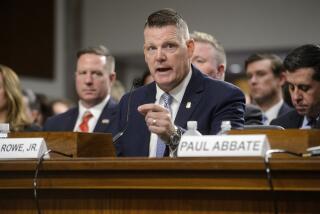Ex-CIA staffer was source of leak on NSA surveillance, Guardian says
WASHINGTON — The Guardian, the British newspaper that revealed a string of top-secret U.S. intelligence systems and programs, identified the source of the disclosures as a former 29-year-old CIA technical staff member who has worked at the National Security Agency as an employee of outside contractors.
In an article on its website Sunday, the newspaper said Edward Snowden, 29, had asked the paper to reveal his identity and that he never planned to remain anonymous. The article said he was staying in a luxury hotel in Hong Kong, and said he had lined the door of his hotel room with pillows to prevent eavesdropping.
“I have no intention of hiding who I am because I know I have done nothing wrong,” he was quoted as saying. He said he expected U.S. authorities to “demonize” him.
The development was the latest in a dizzying week that saw unauthorized publication of a “top secret” order from the Foreign Intelligence Surveillance Court authorizing the collection of telephone records; internal documents on a National Security Agency program that obtains data on foreigners from U.S. Internet companies; a directive from President Obama ordering preparation of a secret target list for cyber warfare; and a digital map that shows where the NSA spies the most.
The Guardian said Snowden was working at an NSA facility in Hawaii three weeks ago when he decided to release the documents. It said he copied the documents and then told a supervisor that he needed to go away for several weeks for medical treatment. He left for Hong Kong on May 20.
The Obama administration has prosecuted six people for illegal disclosures of classified information under the espionage act, more than all other administrations combined. Given the political furor over the leaks of some of the nation’s most closely held secrets, U.S. authorities are likely to swiftly seek Snowden’s arrest and extradition from Hong Kong, which is part of China.
Indeed, earlier Sunday, the chairs of both congressional intelligence committees had called on the Justice Department to prosecute whoever was responsible for the leaks about the telephone and Internet data surveillance programs and other national security secrets to the media in recent days.
Rep. Mike Rogers (R-Mich.), who heads the House intelligence panel, said the unauthorized disclosures served to aid America’s enemies by revealing secret surveillance methods.
“If you tell our adversaries and enemies in the counterterrorism fight exactly how we conduct business, they are not going to do business the same ever again,” he said.
Sen. Dianne Feinstein (D-Calif.), who heads the Senate intelligence committee, said the government needs to plug the leaks immediately. Both lawmakers appeared on ABC’s “This Week.”
Feinstein said the surveillance programs have proved their value in terrorism investigations, but most cases remained classified so officials can’t “give the public an actual idea of people that have been saved, attacks that have been prevented, that kind of thing,” she said.
But Sen. Mark Udall, (D-Colo.), a member of the Senate panel, called for lawmakers to reconsider the Patriot Act, the law that authorizes expanded surveillance by the NSA on Americans, and for a public hearing on whether the government should be allowed to collect so much data on Americans.
He said he supports an NSA program code-named PRISM, which is used to obtain Internet data on foreign targets, but is troubled that the NSA has collected and archived records on virtually every domestic telephone call over the last six years for potential use in terrorism or espionage investigations.
“It’s the scale of this really concerns me and the fact that the American public doesn’t know about it,” he said on CNN’s “State of the Union.” “The fact that every call I make to my friends, to my family, is noted, where I am, the length of it, the date, that concerns me.”
Udall also said he was not convinced that the operation had led to the detection or disruption of any terrorism plots. “It hasn’t been proven that it works,” he said.
Rep. Mike McCaul (R-Texas), who chairs the House homeland security committee, complained of what he called the “warehousing of all the phone records from all the major carriers” by the federal government. “That’s something I think we’ll look at in Congress,” he said on CBS’ “Face the Nation.”
Sen. Rand Paul (R-Ky.), told “Fox News Sunday” that secretly collecting data on every telephone call “sounds like an extraordinary invasion of privacy.” He said he would ask Internet providers and telephone companies to ask their customers to join him in a class-action lawsuit to challenge the legality of the surveillance.
But Michael Hayden, the retired Air Force general who formerly led the CIA and the National Security Agency, defended the programs and said the idea of “trolling through millions of records” was “simply not true.”
He said the database of telephone records can only be accessed with a court order and only in terrorism investigations.
“So you roll up something in Waziristan,” Hayden said. “You get a cellphone number. It’s the first time you’ve ever had that cellphone number. … Here’s how it works: You simply ask that database, ‘Hey, any of your phone numbers in there ever talked to this phone number in Waziristan?’ ”
ALSO:
92-year-old woman fatally hit by truck in Hancock Park
Santa Monica shootings: Death toll rises as fifth victim dies
Services today for teen sisters killed in Newport Beach car crash
More to Read
Get the L.A. Times Politics newsletter
Deeply reported insights into legislation, politics and policy from Sacramento, Washington and beyond. In your inbox three times per week.
You may occasionally receive promotional content from the Los Angeles Times.










